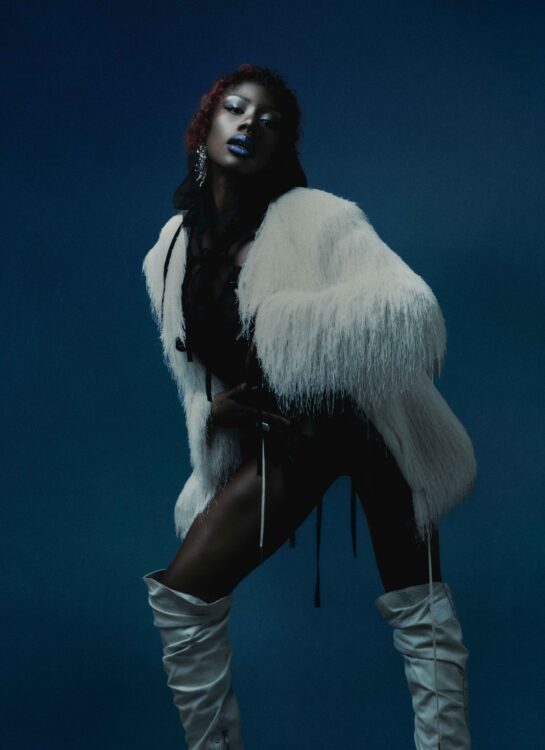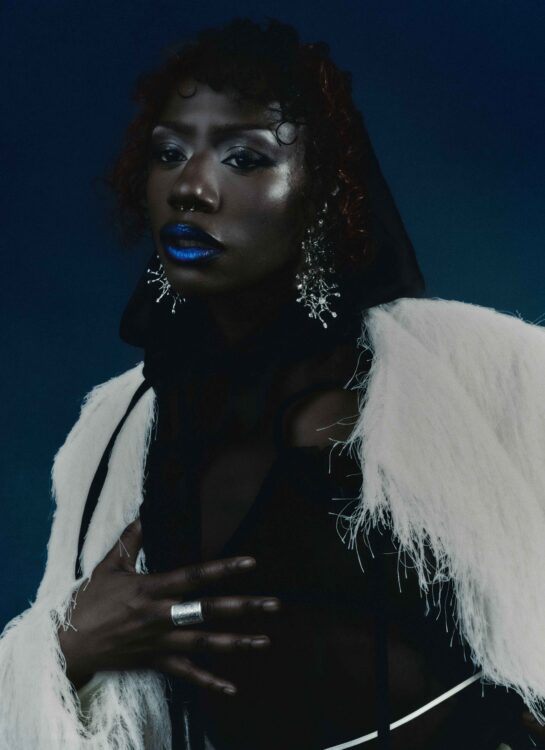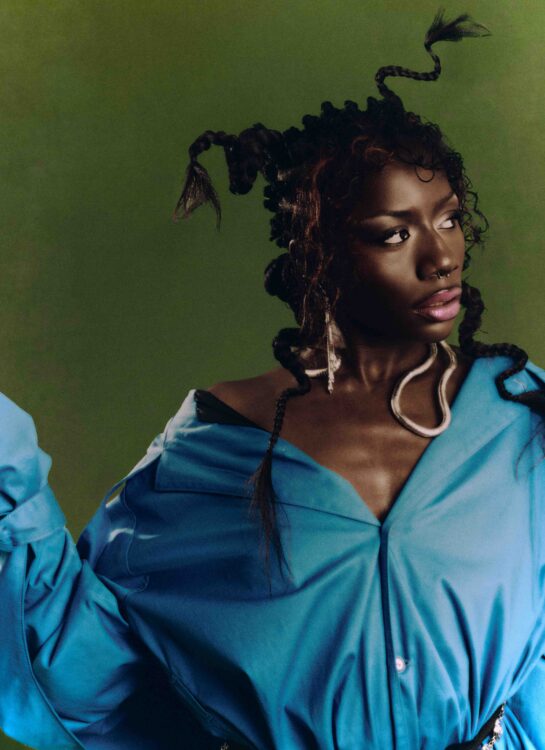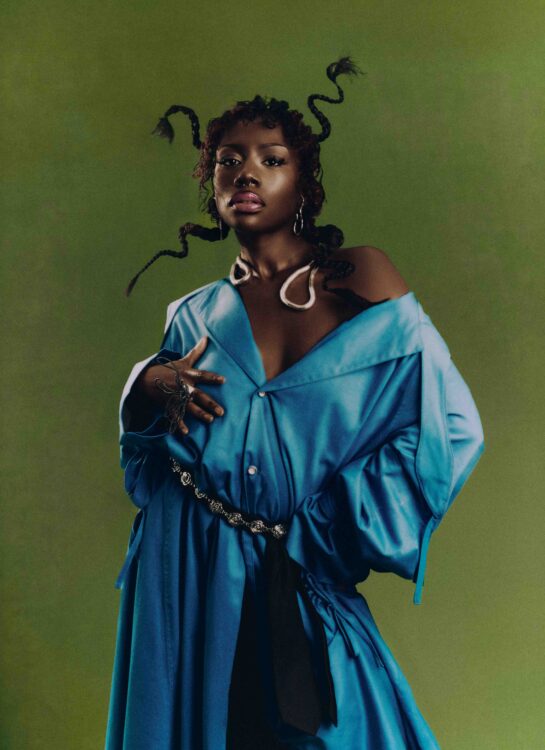- Words Darcy Culverhouse
- Photographer Radhika Muthanna
- Stylist Roma Mitchell
- Makeup Artist Saba Khan
- Hair Stylist Bianca Simone Scott
- First Assistant Charlotte Cullen
- Second Assistant Shay Solaja
- Styling Assistant Charlotte Broadhurst
- Creative Production Studio Notion, Olivia Wright
- Production Assistant Ché Deedigan
South London shapeshifter and AIM Awards nominee BINA. talks leaps of faith, the power of “soft rage” and why independence is her ultimate freedom.
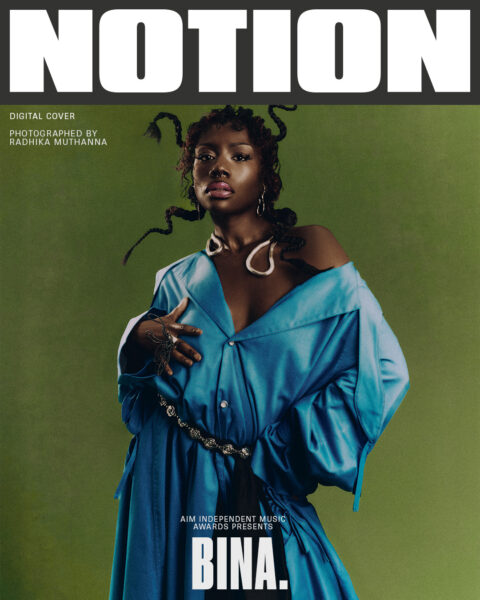
It’s a grey weekday in London, and BINA. is spending her lunch break the way so many of us do: tucked away, a little bored, a little restless. She’s been stacking shelves at Boots, occasionally helping out in the beauty section with shade matching. Then her phone buzzes with a message from her manager: “Bitch, you’re going on tour with Little Simz!”
“I’m going on tour with Little Simz… I’m about to do some shade matches for the girlies, and they have no idea that I’m about to enter my superstar arc,” she laughs.
Spend ten minutes with BINA., and you realise she’s not waiting for the arc to arrive, she’s already in it. When Boots wouldn’t approve her time off request, she quit the job outright. Why stay tethered to fluorescent aisles when Berlin is calling as the first stop on Simz’s European tour? “The plot is really thickening!”, she grins. “It feels really good to have that affirmation in the form of what’s going on in my life right now. My hard work has paid off!”
Released in 2019, BINA.’s debut EP Humble Abode signalled an artist who didn’t want to fit in. Neo-soul? R&B? Jazz? Her sound plays in all those fields, but belongs fully to none of them. It’s restless, fluid and always evolving. South London has long been a breeding ground for category-defying artists, and BINA. is carrying on the tradition. “The cornerstone of everything is freedom. The freedom to create what I want is what makes me feel creatively fulfilled…I want the freedom to make BINA.’s world an even bigger world,” she explains.
That idea of freedom doesn’t just live in her sound; it spills into her lyrics too. If BINA. has felt it, she’s written it. Her music often reads like entries from a personal diary, tracing themes of love, loss, growth and the messy middle spaces in between. Her latest single, ‘Tracy Beaker’ is a perfect example. Turning the beloved TV character into a metaphor for resilience, she folds childhood nostalgia into reflections on her own struggles and growth.
Her debut album Chaos Is Her Name, released late last year, pushes deeper into that territory. Across seven tracks, she picks apart imposter syndrome, anxiety and the bittersweet nature of love, while introducing her self-described indie-soul sound to the world. ‘Self Assured’ drifts with lo-fi ease, her vocals steady as she works through finding strength in herself. ‘Bossy’ flips darkness into something playful, light on its feet. ‘Dopamine’ sits heavier, channelling survivor’s guilt into a track that aches but still glimmers. Vulnerability isn’t just part of BINA’s artistry; it’s the crux of it.
Now, as tour prep collides with new music, her arcs are overlapping. This week, she drops ‘Pendulum’, teasing the track on Instagram with the caption, “soft rage continues”. Built on contradictions, the single is eclectic in sound and jagged in emotion, but tied together by the theory that change is never straight or simple.
BINA. has been nominated as a One to Watch at the AIM Awards, another affirmation that her world is expanding, even as she stays true to her independence. “It means a lot to be recognised by a platform like AIM for making music how I want to make it, and not backing down from that sound.” From her first EP to her debut album, from the aisles of Boots to stages across Europe, BINA. has never played it safe. She’s chasing freedom, and in the process, rewriting what it means to be alternative in 2025.
Catching her before she blows, we sit down with the south London artist to talk leaps of faith, the power of “soft rage” and why independence is her ultimate freedom. Tap in below.
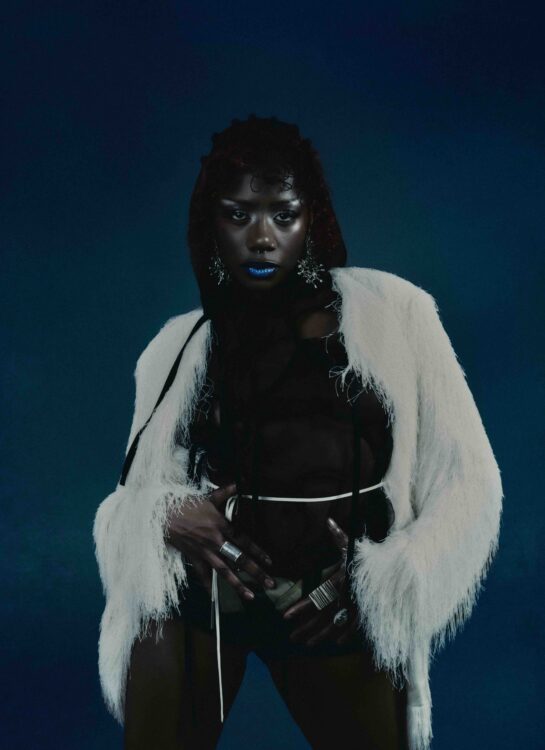
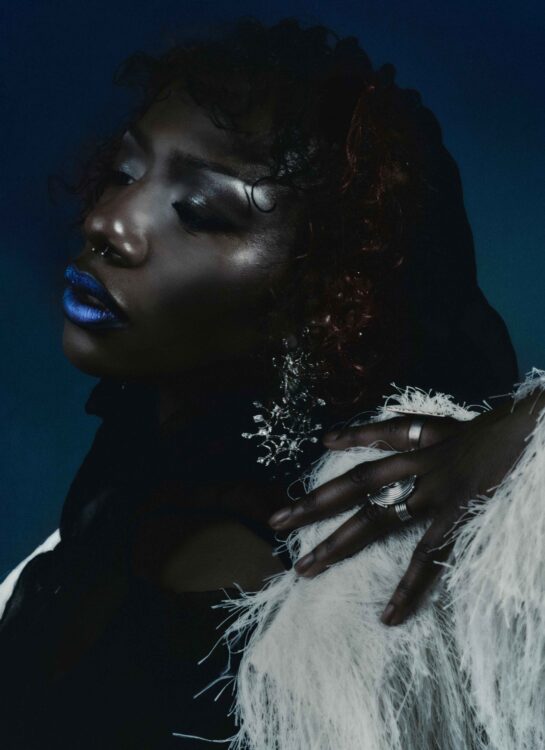
You just quit your job at Boots, right? Was that something you’ve been thinking about for a long time?
I’ve always thought that at the point where something stops being a resource and becomes an obstacle, I have to let the obstacle go. I had the job and it made me feel stable whilst I continued to build, but then I got this Simz tour and I asked them [Boots] for time off, and they usually accommodate it. I said to myself, “If I don’t get all of my time off approved, I will leave,” and then they didn’t, so I was like, “I’m gonna love ya and leave ya, bye!”.
Moving on to Little Simz, how did that conversation come up? Do you remember how it even came to fruition?
The funny thing is, I feel like I’ve lived so much of my life this year within the Boots timeline. I was on my lunch break, and I remember my manager calling me to be like, “bitch, you’re going on tour with Little Simz!” You can’t make this shit up. I was on my break, and nobody knew that I was going on tour with Little Simz. It was so weird, like an Atlanta episode.
It seems like there are so many arcs with you at the moment, you’re branching out in every way.
It feels like that, and it’s why I feel that the timing is so special, because there are so many simultaneous arcs taking place – with the Simz tour, and the AIM nomination – it feels like the plot is really thickening! I have a new song coming out next week. It feels good to have that affirmation in the form of what’s going on in my life right now; my hard work has paid off.
Can you pinpoint the moment in your arc when music stopped being just a love and became the path?
I was studying sciences at sixth form, and partway through my first year, I got involved with theatre and started going to the studio. I’d always loved music, but it was only then that I started to consider it as a career option. I said to myself, ‘I know there’s a likelihood that I might not get the grades that I need to go into A2. If I’m not getting these grades, I’m not retaking the year.’ I decided that if I flop, then I’m going to music college. When that happened, I let the outcomes guide me.
If we go back to the track that you’re dropping the next week, ‘Pendulum’, you say in the caption, “soft rage continues”. What does that mean to you in terms of what you’re putting out and the themes you’re navigating?
For me, “soft rage” is just about letting myself express the more difficult and complex emotions that I feel. I’m naturally quite a chill babe, even when things piss me off, I’m more likely to be silent than to go and break things. I think that mirrors my processing of rage. I think of sadness as a slower emotion than anger, confusion, and angst. As I lean more into those emotions, the sonic palettes I use to express them start to match. It’s literally just allowing myself to gently disarm what would have otherwise been quite destructive emotions if I didn’t express them.
Could you say what ‘Pendulum’ is about? What’s the message behind it?
I feel like I’m consistently discovering myself. When I arrive at a version of myself that I’m comfortable with, I get hit with a curveball. The universe is like, ‘Girl, you’ve got some learning to do!’ ‘Pendulum’ is about change, which can be very confusing and unsettling to me. There’s one line in the song that says, “I’m sewing different pieces of myself back together, so that’s why I’m thirty minutes late,” where I just needed to gather my wits and get to grips with who I’m becoming. The process of becoming a new person isn’t linear, so in the second verse, I explore moments of regressing into bad habits or old ways of thinking and being.
Going back in time, to Chaos is Her Name (CIHN), what do you think that body of work represents in your journey so far?
Chaos is Her Name (CIHN) only came out a year ago; it’s the project that people have discovered me from. I had two EPs before that, Humble Abode and This is Not a Film; they were mainly just beats I found online. When I think about them in comparison to where I am now and CIHN, I feel like I’ve developed even more creatively. CIHN is a good introduction to people if they’re hearing about me for the first time, because it’s a good representation of who I am creatively. It feels bold because we took a lot of creative risks, but they all paid off – from the crazy cover arts to the way we approached the production and songwriting. I do go back sometimes and listen to it, and think, ‘you ate that!’
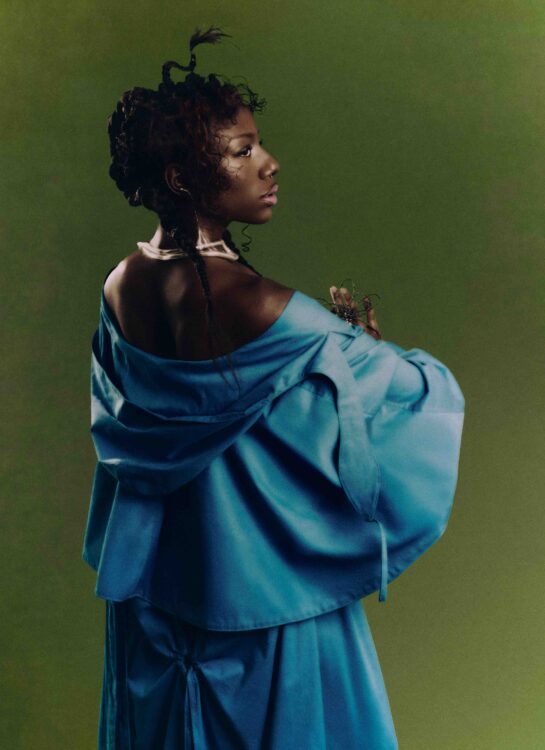
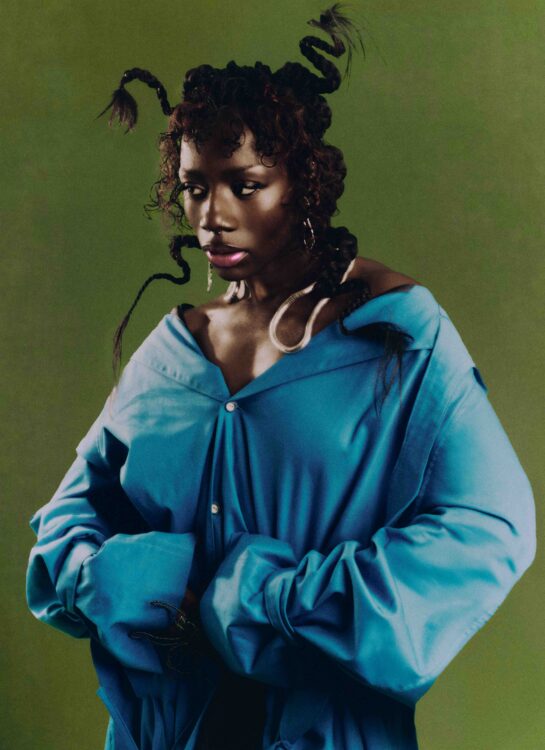
You worked with Subculture, Jay Lock, and Tayo. I’m interested in what collaboration means to you, and how you know when it’s the right creative fit…
Collaboration is really important, but I’m also really picky about it, especially when bringing people into my world. I know what kind of sound I’m building, and I need people who are able to understand that but also push me outside of my comfort zone. I really enjoyed working with Subculture, Jay Lock and Tayo because it felt like they understood me sonically, and I didn’t have to overexplain myself. I listen to how people describe my music, but I like it when people don’t try to recreate another song of mine.
We’ve referenced all these arcs going on, and now you’ve got an AIMS Award nomination. What does that recognition mean to you at this stage in your career?
It’s just another green light. Like, ‘Well done girl, you stuck to being true to yourself and not what people expect of you. You didn’t give in to preconception, you did what you wanted, and it’s paying off’. As much as it’s really nice to have lots of people listening to my music, it’s equally cool to have establishments like AIM acknowledging me. It means a lot to be recognised by a platform like that for making the type of music that I want to make and not backing down from that sound. It encourages me to keep going.
What do you think being an independent artist gives you? Why are independent voices so vital to what’s happening within music and the wider world right now?
The voices that stand out are those that cut through the noise by being themselves. Independent voices are important because they speak to freedom. I’ve been independent my whole career, so I’ve had the time to figure out what I don’t like and develop as an artist without the expectations of someone else.
It’s easy to get stuck in a whirlwind of other people’s expectations or the glamour of what it looks like having a big team around you. None of that means anything if you haven’t had the chance to figure out what success looks like to you. I think it’s important to have an era of independence so that you can have autonomy, because it’s a pillar of your life. Every artist should experience what’s right for them.
What’s the next chapter of BINA’s arc, and what does success look like on your own terms?
The cornerstone of everything is freedom. The freedom to create what I want is what makes me feel creatively fulfilled. I want the freedom to make BINA’s world an even bigger world, because I’m growing into a bigger solar system. I see a lot of artists, like Doechii, Ravyn Lenae, Tyler, The Creator, FKA Twigs and Doja Cat, and I find them all inspiring because they do what they want and have that creative freedom. I never want to feel like I have to compromise. When people call me quirky and different, I take that as a compliment. I just want to continue to be recognised on bigger levels, whether that’s in the industry or with my fans. I feel like we have a cute community going on, and I want more people to be a part of it. I don’t want to be gatekept anymore. Share me with your friends, let’s all be ourselves together!


